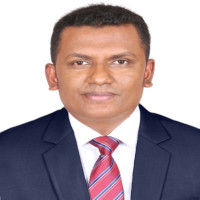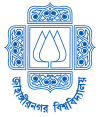
Dr. Ali Akbar Professor, Department of International Relations
PROFILE
SHORT BIOGRAPHY
I am currently working as a Professor in the Department of International Relations at Jahangirnagar University, Savar, Dhaka, Bangladesh. I obtained my PhD, Bachelor (Honors) and Master’s in International Relations from Jahangirnagar University. I have also completed Diploma on Creative Diplomacy from The Regional Centre for Strategic Studies (RCSS), Sri Lanka
I have worked as a Consultant at Monitoring and Evaluation Division (IMED) under the Ministry of Planning, Bangladesh. Currently I am working as a section editor in HRD sector of the National Defence College E-Journal, Dhaka, Bangladesh.
JOURNAL PAPER
Quddus. KM, Akbar, A, Effects of Wastes on Environment and Its Control- A Case Study of Savar Municipality, The National Journal of Local Government, Vol. 39, Issue.1, 2014.Savar is a rapid expanding business and commercial area. Ever incereaing population and economic activities, uncontrol urbanization, proliferation of slums and squatter settelments are the main factors for the generation of huge amount of solid wastes. These wastes are one of the major cause for environmenal pollution. The effects of environmental pollution already visible in the area. However social awareness is very important to control the pollution.
Akbar, Ali, The Euro Crisis and Its Impact on European Economic Integration, Clio: Jahangirnagar University Journal of the Dept.of History, Vol. XXX, 2013.In January 2013 was the 10th anniversary of the birth of the Euro. It was not a peaceful anniversary despite the fact the Euro has become the most circulated currency and the second most traded currency in the world. Because the Euro-zone is facing a great sovereign debt crisis and the Euro in considered as a failed single currency. But this crisis does not mean that the European Economic Integration process is failed. There is now political consensus in Europe that new rules are needed to prevent large deficits, but there is no agreement on what should be done. European politicians reasoned that the use of a common currency would instill in their publics a greater sense of belonging to a European community and that the shift of responsibility for monetary policy from national capitals to a single central bank in Frankfurt would signal a shift of political power.
Akbar, Ali, Water Resource: The Causes of Conflict in the Next Decades., The Jahangirnagar Review, Part-C, Vol. XXIII (ISSN 2306-3920), 2012.Water is the most important issue in contemporary world politics. Fresh water is considered as the next oil. Water has historically been a source of tension and a factor of conflict. Water conflict means a conflict between countries, states or groups over an access to water resources. A large number of water conflicts appear throughout history. Water conflict arises for various reasons including territorial disputes, access to resources and geo-political and geo-strategic advantages. The conflicts occur over both freshwater and saltwater but most of the conflicts occur over fresh water because fresh water is very important for living human being as well as economic development. This paper thus, focus, on the water scarcity problems existing in the contemporary world and further more an actual scenario of accessible water resources that lead the nations towards conflicts.
Akbar, Ali, Negotiation: Theory and Strategy of Disputes Settlement, Journal of International Relations, Vol. II, Issue.2, 2009.Negotiation is one of the common understood arts of human affairs as well as international affairs. It is also the most common approaches used to make decisions and manage disputes. States have negotiated since the beginning of history. Negotiations may occur in business, on profit organization, government branches, among states, nations and personal situation. In states level negotiation is more important because states protect their national interest and resolve disputes through diplomatic process by negotiation.
International negotiation has become the most widely used means of conflict management, rule making and decision-making in international affairs. It concerns not only tangible, matters such as diplomatic relations, wars, and material resources but also identity issues, symbols, rules and norms, and regime and relationship building for cooperative ventures, governance and conflict prevention. Negotiations of international significance are today conducted not only between individual states, but also within and beyond them. At the same time negotiation practice itself is undergoing much change with changing patterns of conflict and intervention, new urgent issues on the global agenda, new actors and new emerging norms
Akbar. A, Khan. RM, Priorities of foreign policy of Bangladesh since 2005., International Journal of Social, Political and Economic Research, Vol. 4, (ISSN: 2667-8810), Issue.1, 2017.Foreign Policy is usually viewed as an extension of domestic policy. Foreign policy refers to the policy of a sovereign state to achieve its desired goals to the foreign countries. The Foreign Policy of Bangladesh emanates from the following provisions of the Bangladesh Constitution. These provisions are stated in Article 25 of the Constitution. So, the principles of Bangladesh foreign policy can't be controversial with the principles of these organizations. The basic principles of Bangladesh foreign policy is Friendship to all and malice towards none. Though it’s difficult for researchers to select a particular topic and develop an appropriate objective which helps the researcher when it’s about explaining the foreign policy and yet for getting a general scenario. The research topic we have selected focuses the modern shifting areas of the foreign policy of Bangladesh.
OTHER
Akbar, Ali, Exacerbating Migration Trends of Indigenous People in Chittagong Hill tracks (CHT) Bangladesh: Addressing its Root Causes, Research Project funded by Faculty of Arts and Humanities, Jahangirnagar University,Diversity makes our world more beautiful and with the appearance of indigenous groups a state becomes diverse. Lamentably, due to various reasons the existence of indigenous people around the world is endangered. In Bangladesh, indigenous people are also facing many problems that encourage them to migrate in other places from the Chittagong Hill Tracts. Frustration created from persecution and injustice compels them to feel insecure in their own land. The increasing migration trend of indigenous people will impact on their culture and socio-economic life in various ways which is also very threatening for their existence in this region. Given some relevant example this paper will try to discuss on the causes of migration trend of indigenous people in the CHT and identify some possible impacts on it.
Akbar, Ali, Cooperative Security Framework of South Asia: Challenges and Opportunities, Research Project Funded by University Grants Commission of Bangladesh, Jahangirnagar University, 2020.Historically South Asia has numerous, long standing conflicts. In the recent years several other issues have been added to the portfolio of security issues such as demography, economic security, environmental security, terrorism, etc., are issues requiring cooperation among countries of the region. Most states in South Asia are vulnerable to non-traditional security threats. Any particular country was unable to face these challenges alone lacks of capabilities and mechanism to deal with these issues. Therefore, South Asia should adopt a cooperative security approach to face the security challenges together.
Teaching
| Course Code | Course Title | Semester/Year |
|---|---|---|
| 402 | Foreign Policy of Bangladesh | 4th Year |
| 301 | International Negotiation and Diplomacy | 3rd Year |
Academic Info
Period: 2022
PhD
Period: 2005
M.A in International Relations
Period: 2004
B.A ( Honors) in International Relations
Period: 2008
Professonal Course on Media & Global Politics
Period: 2016
Diploma on Creative Diplomacy
Experience
Position: Professor, Dept. of International Relations
Period: 20 January 2025 -
Position: Associate Professor, Dept. of International Relations
Period: 14th October 2020-19 January 2025
Position: Assistant Professor, Dept. of International Relations
Period: 12th August 2012- 13th October 2020
Position: Lecturer, Dept. of International Relations
Period: 13th July 2009-11th August 2012
Position: Part time Faculty, Dept. of International Relations
Period: 17th November 2008-12 July 2009
Contact
Dr. Ali Akbar
Professor
Department of International Relations
Jahangirnagar University, Savar, Dhaka-1342, Bangladesh.
Work Phone: +88(02)7791045-51 Extn.1378
Email: akbar@juniv.edu

